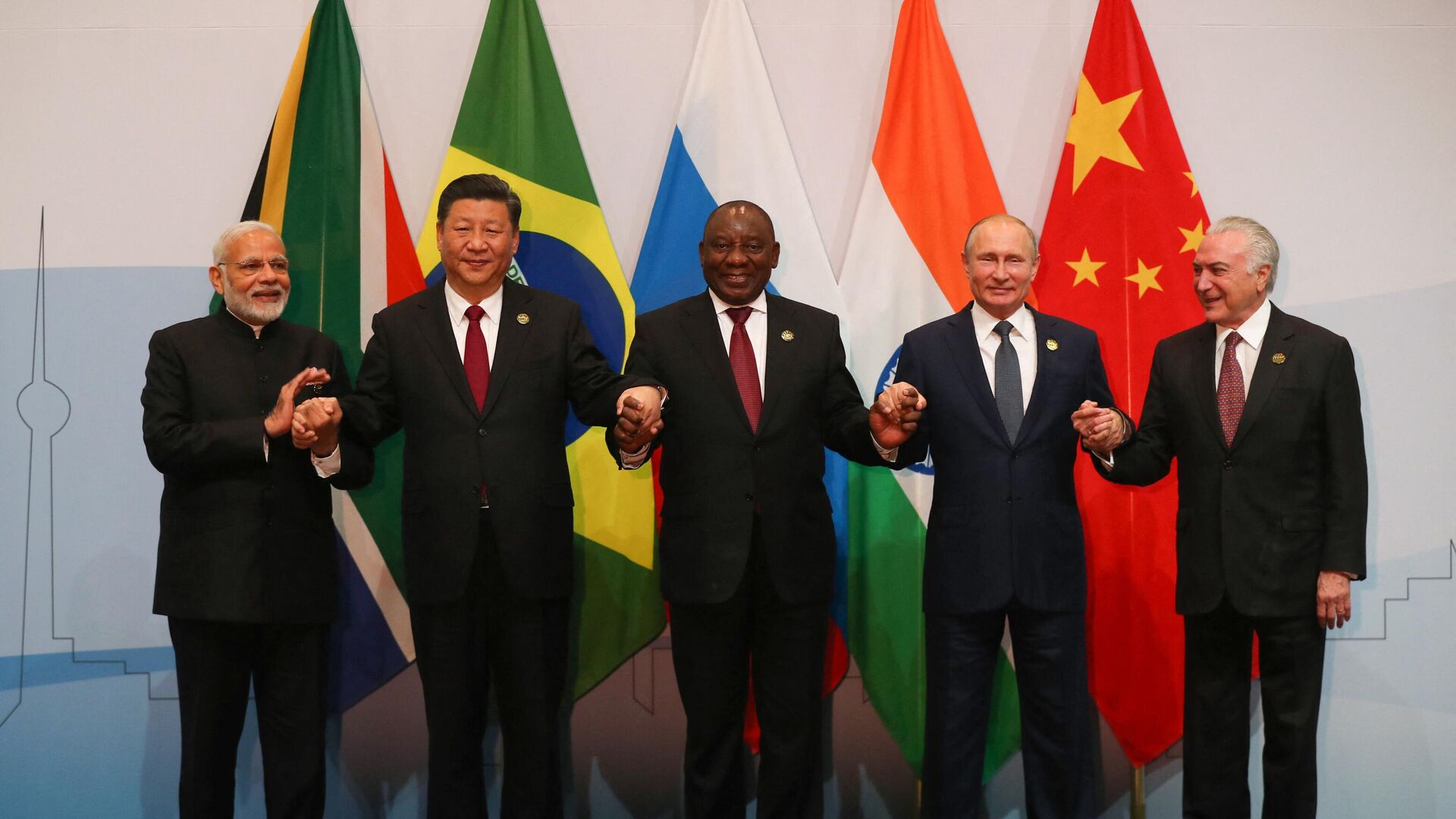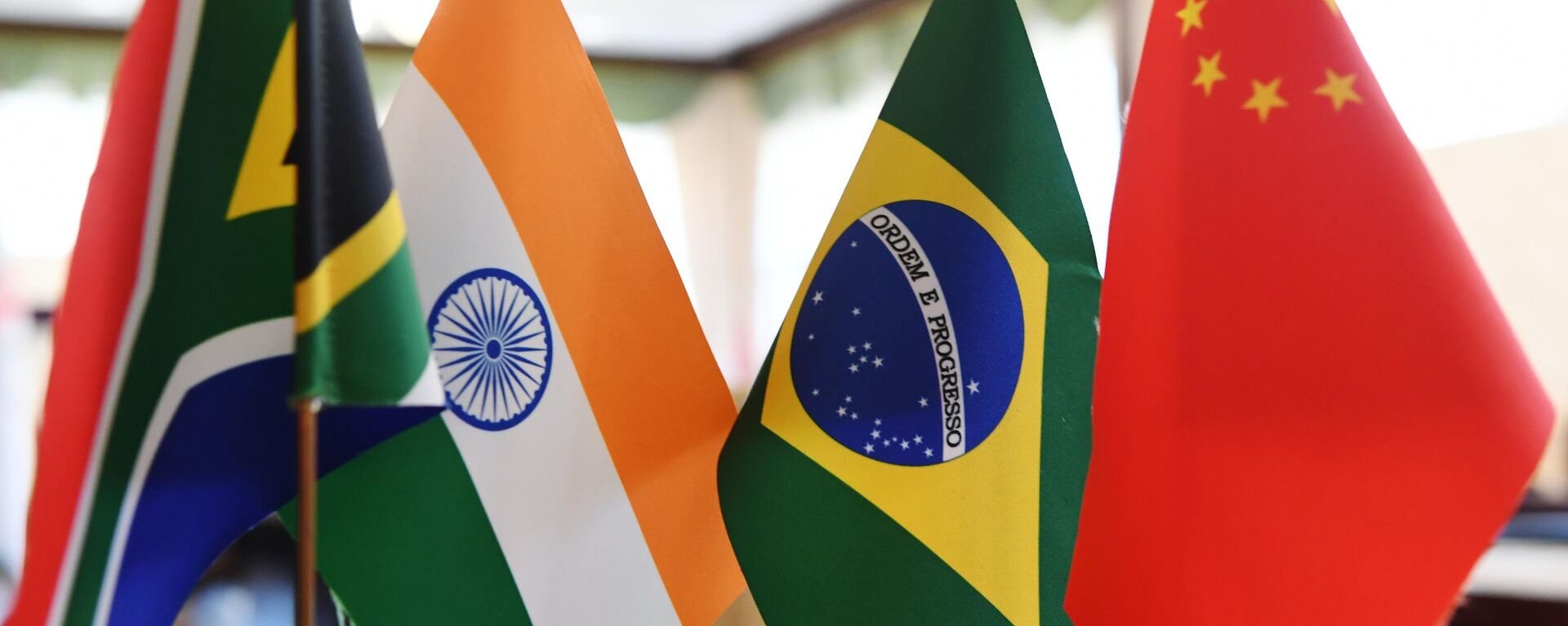https://en.sputniknews.africa/20230414/twilight-of-the-idols-how-will-brics-eclipse-the-west-1058591804.html
'Twilight of the Idols': How Will BRICS Eclipse the West?
'Twilight of the Idols': How Will BRICS Eclipse the West?
Sputnik Africa
The BRICS group is probably gaining the upper hand over the West in the long-lasting battle, said Valdir da Silva Bezerra, a researcher at the BRICS Studies Group, in his article for Sputnik.
2023-04-14T13:23+0200
2023-04-14T13:23+0200
2023-08-03T10:44+0200
opinion
brics
brics expansion
africa in details
gdp
economy
https://cdn1.img.sputniknews.africa/img/07e7/04/0e/1058592205_0:0:3110:1750_1920x0_80_0_0_8d65fad37c7e86489b93d0cbf94b97e3.jpg
The BRICS group is probably gaining the upper hand over the West in the long-lasting battle, said Valdir da Silva Bezerra, a researcher at the BRICS Studies Group at the University of São Paulo, Brazil, in his article for Sputnik.Bezerra supported his viewpoint with evidence from the International Monetary Fund (IMF), recalling that in 2020, the contribution of the BRICS to global GDP (PPP) was 31.5%, while the G7 countries contributed 30%. In 2030, it is expected that this figure will exceed 50%.Furthermore, the five BRICS countries together represent more than 40% of the planet's population, accounting for more than a third of the global food supply. According to Bezerra, all these numbers indicate that the organization is gradually eclipsing the major Western powers in many respects.He noted that "the unequivocal recognition of the group's role" is a major factor of a global political transformation that goes in line with the idea of "a truly multipolar world."Why the BRICS? The first explanation of the growing BRICS's popularity, according to Bezerra, is their desire to create a multipolar world that resonates with aspirations of many nations across the globe. The issues addressed in its development programs, he noted, could be more attractive for developing countries than what Western organizations have been proposing for ages.Moreover, the rise of the group takes place against the backdrop of growing distrust with regard to the "exorbitant privileges of the United States" in the global monetary system, mainly due to the role of the dollar as an international exchange currency. He also pointed out the "crisis of legitimacy," seen in the main post-war multilateral financial institutions, such as the World Bank and the IMF.Bezerra underlined that the obsolete notion that the great powers of the West were the only ones capable of ensuring stability in the international system was nothing more than means "of justifying the maintenance of the status quo and opposing the changes" that could benefit the interests of "an ever-widening group of countries."Since the outbreak of the 2008 financial crisis, which hit the countries of the Global North, and the subsequent creation of the BRIC group in 2009 in the Russian city of Ekaterinburg, the world has been witnessing the emergence of an "initiative whose aggregate potential is becoming increasingly visible."According to Bezerra, since its creation, the group has highlighted the need to increase the "voice and representation" of developing countries in the world's governance mechanisms in order to promote an "open, inclusive and balanced economic globalization," thus correcting the outdated North-South dichotomy.BRICS' Appeal to the 'Global South'The expert also stated that the BRICS has always emphasized the importance of multiple centers of cultural and civilizational influence in the world. This, according to him, goes against "the universal pretensions of the US values and the so-called American way of life."This explains the recent interest of several countries in the Islamic world in joining the group, including Tunisia, Turkiye, Iran, Saudi Arabia, and Egypt. He stated that these states are also interested in defending the plurality of civilizations and value systems in international relations.Bezerra noted that by cooperating with the BRICS, the Muslim world will have greater opportunities to deal with "the cultural imperialism of the West that is taking place today."The BRICS, in turn, represents the antithesis of this global hegemonic model of "the old idols," in which a single center of power has the capacity to impose its visions and preferences on the other actors in the system. According to Bezerra, the new model is based on "collective" leadership, and on the concept of a multipolar world.
https://en.sputniknews.africa/20230407/1058514656.html
Sputnik Africa
feedback@sputniknews.com
+74956456601
MIA „Rossiya Segodnya“
2023
News
en_EN
Sputnik Africa
feedback@sputniknews.com
+74956456601
MIA „Rossiya Segodnya“
Sputnik Africa
feedback@sputniknews.com
+74956456601
MIA „Rossiya Segodnya“
brics group, cooperation, multipolar world, gloval south, transformation of global political system
brics group, cooperation, multipolar world, gloval south, transformation of global political system
'Twilight of the Idols': How Will BRICS Eclipse the West?
13:23 14.04.2023 (Updated: 10:44 03.08.2023) Longread
The BRICS group is an informal organization of the world's leading emerging economies that encompasses Brazil, Russia, India, China and South Africa. In recent years, its influence on international relations and the global economy has been growing rapidly, prompting experts to predict that the group might outshine former world leaders.
The BRICS group is probably gaining the upper hand over the West in the long-lasting battle, said Valdir da Silva Bezerra, a researcher at the BRICS Studies Group at the University of São Paulo, Brazil, in his article for Sputnik.
Bezerra supported his viewpoint with evidence from the International Monetary Fund (IMF), recalling that in 2020, the
contribution of the BRICS to global GDP (PPP) was 31.5%, while the G7 countries contributed 30%. In 2030, it is expected that this figure will exceed 50%.
Furthermore, the five BRICS countries together represent more than 40% of the planet's population, accounting for more than a third of the global food supply. According to Bezerra, all these numbers indicate that the organization is gradually eclipsing the major Western powers in many respects.
"Due to these numbers and the growing interest of several states in joining the BRICS, we witness the twilight of the former idols of the international system, which indicates the birth of a new era," the researcher highlighted.
He noted that "the unequivocal recognition of the group's role" is a major factor of a global political transformation that goes in line with the idea of "a truly multipolar world."
The first explanation of the growing BRICS's popularity, according to Bezerra, is their desire to create a multipolar world that resonates with aspirations of many nations across the globe. The issues addressed in its development programs, he noted, could be more attractive for developing countries than what Western organizations have been proposing for ages.
Moreover, the rise of the group takes place against the backdrop of growing distrust with regard to the "exorbitant privileges of the United States" in the global monetary system, mainly due to the role of the dollar as an international exchange currency. He also pointed out the "crisis of legitimacy," seen in the main post-war multilateral financial institutions, such as the World Bank and the IMF.
As a result, the BRICS has emerged "as kind of a lawyer for developing countries" that advocates for "a fairer" world order based on the sovereign choice of each country with respect to its social, economic and political features.
Bezerra underlined that the obsolete notion that the great powers of the West were the only ones capable of ensuring stability in the international system was nothing more than means "of justifying the maintenance of the status quo and opposing the changes" that could benefit the interests of "an ever-widening group of countries."
"The relative strength of the G7 states during the 1990s and mid-2000s is partly connected with the lack of existing political coordination between emerging economies, which couldn't find space in international organizations to defend their interests and increase their voice," the researcher explained.
Since the outbreak of the 2008 financial crisis, which hit the countries of the Global North, and the subsequent creation of the BRIC group in 2009 in the Russian city of Ekaterinburg, the world has been witnessing the emergence of an "initiative whose aggregate potential is becoming increasingly visible."
According to Bezerra, since its creation, the group has highlighted the need to increase the "voice and representation" of developing countries in the world's governance mechanisms in order to promote an "open, inclusive and balanced economic globalization," thus correcting the outdated North-South dichotomy.
BRICS' Appeal to the 'Global South'
The expert also stated that the BRICS has always emphasized the importance of multiple centers of cultural and civilizational influence in the world. This, according to him, goes against "the universal pretensions of the US values and the so-called American way of life."
This explains the recent interest of several countries in the Islamic world in joining the group, including Tunisia, Turkiye, Iran, Saudi Arabia, and Egypt. He stated that these states are also interested in defending the plurality of civilizations and
value systems in international relations.
Bezerra noted that by cooperating with the BRICS, the Muslim world will have greater opportunities to deal with "the cultural imperialism of the West that is taking place today."
The BRICS, in turn, represents the antithesis of this global hegemonic model of "the old idols," in which a single center of power has the capacity to impose its visions and preferences on the other actors in the system. According to Bezerra, the
new model is based on "collective" leadership, and on the concept of a multipolar world.
"Everything in life has its cycle and duration. Today, we are witnessing the decline of Western powers, due to the dispersion of political and economic power to new centers of influence. The day is coming to an end for the old idols. But it is just beginning for the BRICS," the researcher concluded.


